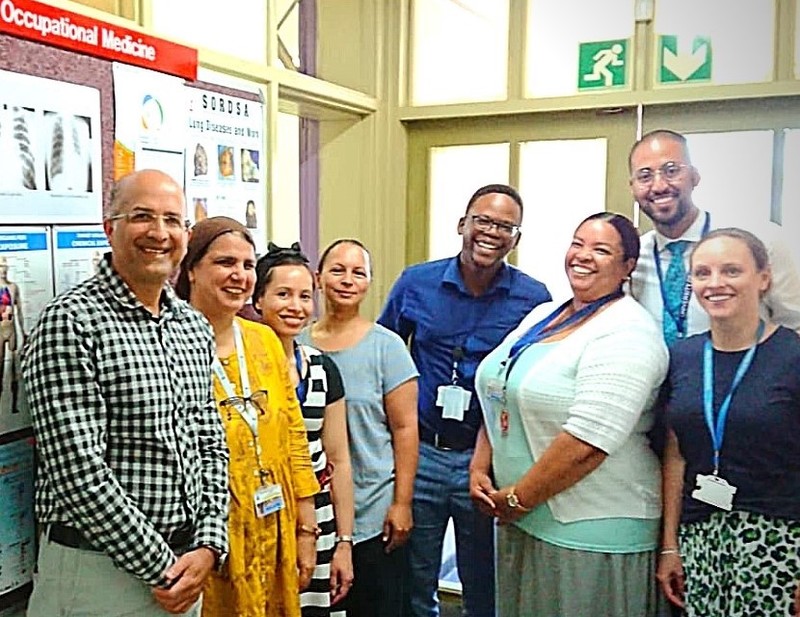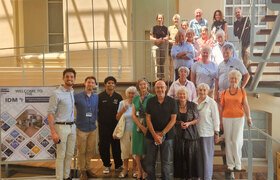Occupational Medicine advocates for workplace health and safety
23 December 2020 Read time 4 min.
“COVID-19 forced us to delve deep into our inner resources to appreciate our common humanity and use our skills and creativity to act with unreserved solidarity and compassion in facing the challenges in our workplaces and broader community,” says Professor Mohamed Jeebhay, head of the Division of Occupational Medicine based in the School of Public Health and Family Medicine (SOPHFM).
The COVID-19 pandemic highlighted the need for occupational medicine expertise to inform occupational health and safety (OHS) policy, workplace strategies, safeguard worker’s health and return to work strategies aimed at mitigating the impact of COVID-19 on workers and workplaces. The primary goal was to ensure workforce preservation for sustainable economic activity and health care delivery amidst widespread economic upheaval. The Division was centrally involved in providing occupational health and safety policy and technical support to the University, the Faculty of Health Sciences as well as the national and provincial Departments of Health during this period.
Jeebhay served on the management team of the Occupational Health and Safety Stream established by the National Department of Health that provided technical input into COVID-specific occupational health and safety policies related to workplace risk assessment; screening, testing and ongoing health monitoring of workers; management of vulnerable workers; the submission of COVID-19 related health data from workplaces. He sits on the scientific committee of the COVID-19 Occupational Health and Safety Surveillance System (OHSS), which he was instrumental in setting up. One of his key contributions was his engagement with other social partners at the National Economic Development and Labour Council (NEDLAC), where he served as advisor for COVID-19 related to the writing of legislation addressing occupational health safety and worker’s compensation. He also contributed to various training initiatives and provided OHS support to the Northern Cape.
Jeebhay was centrally involved in the development of a return to work mobile health screening tool (the COVID-19-Medical passport) for use by general workplaces and higher institutions of learning to ensure that entrants were free of COVID-19 related symptoms when they entered their place of work.
Senior lecturer, Dr Amy Burdzik, provided clinical support at the UCT Occupational health service to ensure that all staff were screened and their health risks minimised as far as possible. Together with Jeebhay and Associate Professor Shahieda Adams (head of the occupational medicine clinic), Burdzik also provided input into Faculty policies and standard operating procedures (SOPs) geared at managing the health and safety aspects related to COVID-19, ventilation of lecturing venues and a return to work of staff and students. Adams, through her participation in the UCT Health Advisory Working Group, provided policy support to the broader University in relation to return to standard operations procedures for returning staff and students.
The Occupational Medicine Division, made a significant contribution to managing the health and safety of staff and in particular health workers in the Western Cape province during this challenging time. This included the development of OHS policy and essential training of staff in the Western Cape Department of Health. Adams says, “The COVID pandemic has demonstrated the crucial role played by health workers in treating cases and managing the health impacts of the pandemic. It is this realisation that has thrown a spotlight on the working conditions, hazardous exposures and increased risk to health faced by these frontline staff.” In the Western Cape, health workers comprised 5% of total COVID-19 cases with 80% of cases in public health sector facilities. In contrast to the overall 5% prevalence of COVID-19 in the general, it is estimated that 10% of health workers are affected.
There was therefore a need to focus on workplace polices that address health and safety considerations of health workers, to limit spread of the pandemic and ensure the delivery of essential services and facilitate return to work. All of these required technical input by occupational health experts.
The team also needed to navigate difficult terrain such as dealing with the anxiety and mental health impact of COVID- 19 amongst health workers, managing vulnerable employees while maintaining service delivery, exploring how to build resilience amongst staff, and balancing the health service needs with individual health needs when advising on return to work strategies. Burdzik led the development of easy-to-use guidelines for ‘protecting your skin’, while Jeebhay raised awareness of asthma associated with cleaning agents following his research on occupational allergy and asthma. Both asthma and dermatitis were increasingly being reported during the COVID-19 pandemic, due to widespread use of personal protective equipment and disinfectants.
 This work is licensed under a Creative Commons Attribution-NoDerivatives 4.0 International License.
This work is licensed under a Creative Commons Attribution-NoDerivatives 4.0 International License.
Please view the republishing articles page for more information.










